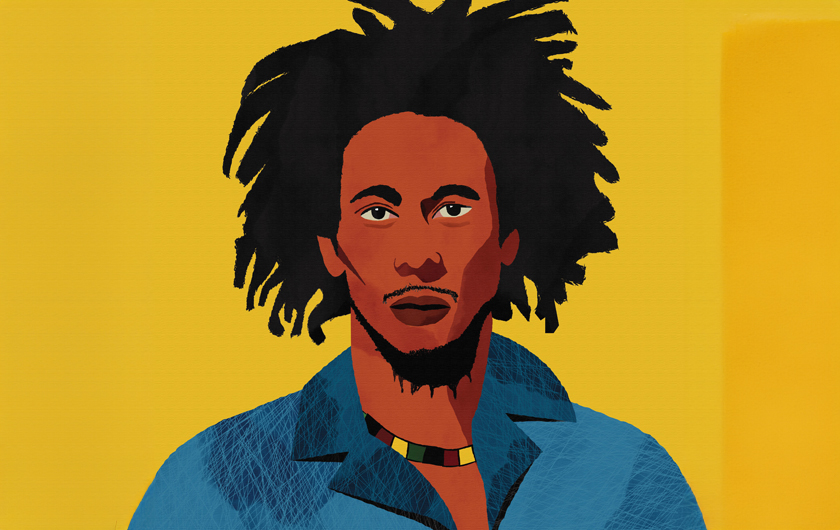In February 2025 we celebrate the 80th birthday of this reggae icon with A Tribute to Bob Marley.
Keep scrolling to discover more about his musical contributions throughout the years.

1945
Robert Nesta Marley is born on 6 February in Nine Mile, Jamaica.
1963
Marley forms a ‘ska’ vocal group with Peter Tosh and Neville O’Riley Livingston, aka Bunny Wailer. They perform under several names including The Teenagers and The Wailing Rudeboys before settling on The Wailers.
1965
The group record their studio debut, The Wailing Wailers, which includes an early version of the song One Love.
1970
Credited as Bob Marley and the Wailers, they release Soul Rebels, their second album and the first to be distributed outside of Jamaica. It is recorded by legendary reggae producer Lee “Scratch” Perry along with his band, The Upsetters.
1973
After signing to Island Records, The Wailers produce two albums in one year — Catch A Fire and Burnin’ — bringing them international recognition. They tour the U.K. and U.S., including a three-night-stand in New York City with another new artist on the rise, Bruce Springsteen.
1975
Peter Tosh and Bunny Wailer leave the group in pursuit of solo careers. Marley soldiers on under the Wailers banner with the release of Live! in December, spawning a hit single with that album’s version of No Woman, No Cry.
1976
With Rastaman Vibration, Marley gains his first Top-10 album in the U.S. charts. Months after its release, Marley survives an assassination attempt at his home in Kingston.
1977
Now self-exiled in London, Marley goes Gold in the U.S., U.K., and Canada with Exodus, which features classic tracks such as Jammin, Turn Your Lights Down Low, Three Little Birds, and One Love/People Get Ready.
1978
Marley makes a triumphant return to Jamaica headlining the One Love Peace Concert. With the country embroiled in civil unrest, Marley famously joins the hands of leaders from opposing political factions on stage.
1980
Having released the song Zimbabwe the previous year, Marley is invited to perform at that country’s independence celebrations in April. His anthem is cited as being instrumental to its’ liberation movement. Uprising, the final studio album released in his lifetime comes out in June. It includes the beloved acoustic version of Redemption Song.
1981
Bob Marley dies of the cancer he had been fighting since 1977.
1984
The posthumous compilation album Legend is released, going on to become the best-selling reggae album of all time.
1945
Robert Nesta Marley is born on 6 February in Nine Mile, Jamaica.
1963
Marley forms a ‘ska’ vocal group with Peter Tosh and Neville O’Riley Livingston, aka Bunny Wailer. They perform under several names including The Teenagers and The Wailing Rudeboys before settling on The Wailers.
1965
The group record their studio debut, The Wailing Wailers, which includes an early version of the song One Love.
1970
Credited as Bob Marley and the Wailers, they release Soul Rebels, their second album and the first to be distributed outside of Jamaica. It is recorded by legendary reggae producer Lee “Scratch” Perry along with his band, The Upsetters.
1973
After signing to Island Records, The Wailers produce two albums in one year — Catch A Fire and Burnin’ — bringing them international recognition. They tour the U.K. and U.S., including a three-night-stand in New York City with another new artist on the rise, Bruce Springsteen.
1975
Peter Tosh and Bunny Wailer leave the group in pursuit of solo careers. Marley soldiers on under the Wailers banner with the release of Live! in December, spawning a hit single with that album’s version of No Woman, No Cry.
1976
With Rastaman Vibration, Marley gains his first Top-10 album in the U.S. charts. Months after its release, Marley survives an assassination attempt at his home in Kingston.
1977
Now self-exiled in London, Marley goes Gold in the U.S., U.K., and Canada with Exodus, which features classic tracks such as Jammin, Turn Your Lights Down Low, Three Little Birds, and One Love/People Get Ready.
1978
Marley makes a triumphant return to Jamaica headlining the One Love Peace Concert. With the country embroiled in civil unrest, Marley famously joins the hands of leaders from opposing political factions on stage.
1980
Having released the song Zimbabwe the previous year, Marley is invited to perform at that country’s independence celebrations in April. His anthem is cited as being instrumental to its’ liberation movement. Uprising, the final studio album released in his lifetime comes out in June. It includes the beloved acoustic version of Redemption Song.
1981
Bob Marley dies of the cancer he had been fighting since 1977.
1984
The posthumous compilation album Legend is released, going on to become the best-selling reggae album of all time.
This concert is presented in partnership with Arts Commons Presents and Jones & Jones Productions.
